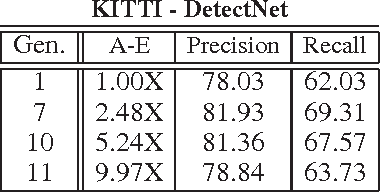Evolution in Groups: A deeper look at synaptic cluster driven evolution of deep neural networks
Paper and Code
Apr 07, 2017



A promising paradigm for achieving highly efficient deep neural networks is the idea of evolutionary deep intelligence, which mimics biological evolution processes to progressively synthesize more efficient networks. A crucial design factor in evolutionary deep intelligence is the genetic encoding scheme used to simulate heredity and determine the architectures of offspring networks. In this study, we take a deeper look at the notion of synaptic cluster-driven evolution of deep neural networks which guides the evolution process towards the formation of a highly sparse set of synaptic clusters in offspring networks. Utilizing a synaptic cluster-driven genetic encoding, the probabilistic encoding of synaptic traits considers not only individual synaptic properties but also inter-synaptic relationships within a deep neural network. This process results in highly sparse offspring networks which are particularly tailored for parallel computational devices such as GPUs and deep neural network accelerator chips. Comprehensive experimental results using four well-known deep neural network architectures (LeNet-5, AlexNet, ResNet-56, and DetectNet) on two different tasks (object categorization and object detection) demonstrate the efficiency of the proposed method. Cluster-driven genetic encoding scheme synthesizes networks that can achieve state-of-the-art performance with significantly smaller number of synapses than that of the original ancestor network. ($\sim$125-fold decrease in synapses for MNIST). Furthermore, the improved cluster efficiency in the generated offspring networks ($\sim$9.71-fold decrease in clusters for MNIST and a $\sim$8.16-fold decrease in clusters for KITTI) is particularly useful for accelerated performance on parallel computing hardware architectures such as those in GPUs and deep neural network accelerator chips.
 Add to Chrome
Add to Chrome Add to Firefox
Add to Firefox Add to Edge
Add to Edge